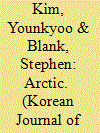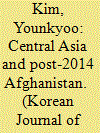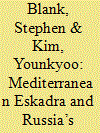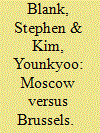|
|
|
Sort Order |
|
|
|
Items / Page
|
|
|
|
|
|
|
| Srl | Item |
| 1 |
ID:
108563


|
|
|
|
|
| Publication |
2011.
|
| Summary/Abstract |
China has clearly emulated Russia's previous example of making loud claims and
increasing military patrols in the Arctic. China will likely become a major player
in Arctic trade routes and become a main destination for goods shipped through
the Northern Sea Route. It is likely that a significant part of future Russian oil
and gas production will ultimately be supplied to China. What are the strategic
implications of China's active involvement in Arctic politics? The Arctic "Great
Game" is often described as a new Cold War between the United States and Russia.
Regionally, the two main protagonists are Russia and Norway. This article makes a
different argument. The Arctic has recently become an issue on the Russo-Chinese,
and possibly Russo-Japanese security agenda. The first goal of this article is to
examine the Arctic policy and strategy of Russia, perhaps the most difficult nation
to understand in terms of Arctic security. The second goal of the article is to
explain how the Arctic has become an issue of concern in Russia's relationship
with China.
|
|
|
|
|
|
|
|
|
|
|
|
|
|
|
|
| 2 |
ID:
142091


|
|
|
|
|
| Summary/Abstract |
As the NATO withdrawal proceeds in Afghanistan, both the Alliance and key members will encourage Central Asian states to assume more responsibility for providing their own security. But such a task is enormous for most Central Asian governments. Thus, they fear that they might be abandoned to Moscow, if not Beijing, or left on their own to face what they believe to be a mounting terrorist threat. This article examines the already visible military and strategic rivalry between Moscow and Washington for hegemony in Central Asia—mainly through support for weapon transfers, basing rights, and regional integration mechanisms in the security field.
|
|
|
|
|
|
|
|
|
|
|
|
|
|
|
|
| 3 |
ID:
124195


|
|
|
|
|
| Publication |
2013.
|
| Summary/Abstract |
The most outstanding trend in contemporary conflicts has been the fusion of the threats from terrorism and insurgency. Insurgent threats in many places on the globe today are mistaken as terrorist threats, and counterterrorism (CT) is deployed as the local insurgents come increasingly to resemble their transnational terrorist partners. Such an emphasis on the role of terrorism in insurgencies and the undue focus on CT risks strengthening, rather than severing, the connection between local insurgents and transnational terrorists. Russia's counterterrorist strategy inadvertently transformed the conflict from a contained, nationalist rebellion to a sprawling jihadi insurgency and perversely encouraged the group to resort even more to terrorist tactics. The Russian counterinsurgency has been unsuccessful, as the insurgents are neither demolished as a force nor are they isolated by society. Losing the hearts and minds among the Chechen people is a key reason behind why the Russian operation in Chechnya suffered failures. Too little attention was paid to winning over the "hearts and minds" of the people.
|
|
|
|
|
|
|
|
|
|
|
|
|
|
|
|
| 4 |
ID:
181876


|
|
|
|
|
| Summary/Abstract |
Russia seeks to convert the Black Sea into a Russian lake. This entails projecting power well into the Mediterranean Sea. Since 2013 Moscow has reinforced the missile, air defence, and submarine component of its Mediterranean Eskadra (Squadron) to deny NATO access to the Eastern Mediterranean and Black Seas. This article explains how and why Russia's Mediterranean Eskadra has become a major arm of Russia's military-political strategy in these waters. By analysing its missions, roles, and activities the article shows how Moscow conducts innovative, sophisticated, yet simultaneously traditional military-political operations to maximise and enhance its global standing in accordance with its own strategy. The article further argues that the Eskadra's creation and deployment corresponds not just to the revival of Russian military capability in 2013, but also to a much broader Russian perspective on contemporary war, and analyzes Russia's political considerations in the deployment of major military forces in the Mediterranean Basin.
|
|
|
|
|
|
|
|
|
|
|
|
|
|
|
|
| 5 |
ID:
132513


|
|
|
|
|
| Publication |
2014.
|
| Summary/Abstract |
Many see the western Balkans as the back yard of Europe. As the promise and reality of regional economic integration has weakened, however, Russia has returned to the area to play its historically important regional role. In the Balkans, a Russian or Russifying project competes against a European Union project, while Washington has shown little interest in the Balkans during the Barack Obama administration. The instruments of this rivalry are not only, or even primarily, armies but rather economic-political forces: control of energy pipelines and production, the use of that control for political objectives, and the attraction of competing political models.
|
|
|
|
|
|
|
|
|
|
|
|
|
|
|
|
| 6 |
ID:
145501


|
|
|
|
|
| Summary/Abstract |
This essay examines Russia’s ongoing counterinsurgency war in the North Caucasus in the light of Russian historical strategies and some Western or comparative principles that pertain to such wars. We argue that Russia is failing to bring this war toward resolution and that it is already deforming the state structure and could engender even more negative consequences for the Russian state due to conditions under which it is being waged, including the impact of Moscow’s wars in Syria and Ukraine.
|
|
|
|
|
|
|
|
|
|
|
|
|
|
|
|
| 7 |
ID:
116637


|
|
|
|
|
| Publication |
2012.
|
| Summary/Abstract |
China's Border Policies toward Central Asia since 1991 are revealing indicators of the growth of Chinese power and the expansion of Chinese objectives with regard to the region. As China has grown more powerful, its interest in acquiring more land in Central Asia and in altering the borders to meet its new interests has also increased. The goal of this article is to call attention to and explain this trend inChina's border policy toward Central Asia since 2000.
|
|
|
|
|
|
|
|
|
|
|
|
|
|
|
|
| 8 |
ID:
126793


|
|
|
|
|
| Publication |
2013.
|
| Summary/Abstract |
Bandwagoinng with China against the United States and simultaneously covertly trying to testation China have been the dominant motives of Russia's Asian in Northeast and Southeast Asia. Throughout the 2000s. due to this dual-smelt policy. Russia had resigned itself to its growing economic dependence on China and its role as an energy source China. Between 2009and20lz. Russia madeaconseiouselibtt to portray itself as an Asian played. However. Russia's failure to develop the Russian Fat East (RFE) has fumed it to "turn to China for help". and this has allowed China to begin building a new economic and security otdet in Asia at Russia's expense. The nature and din.-action of the Russo-Chinese "strategic partnership" under Chinese President Xi jinxing and Russian President Vladimir Putin is aping becoming a subject of intense debate. The mayor assumption of this atticle is that it is unliltely that Russia would simply acquiesce in subonlination to China without tufting to situations with negativity.
|
|
|
|
|
|
|
|
|
|
|
|
|
|
|
|
| 9 |
ID:
123697


|
|
|
|
|
| Publication |
2013.
|
| Summary/Abstract |
China is already outpacing Russia, which is encountering ever more difficulties in trying to arrange a continental bloc of satellite states. While it may not be possible for China to organize its own version of such a bloc given the deep-rooted regional fears and apprehensions about Chinese objectives, in the coming years it will probably be the primary foreign economic presence in Central Asia, able to cash in on the political advantages that accrue to any such power
|
|
|
|
|
|
|
|
|
|
|
|
|
|
|
|
| 10 |
ID:
126001


|
|
|
|
|
| Publication |
2013.
|
| Summary/Abstract |
Ukraine's current policy line is counterproductive, according to the authors. Not only may potential supporters be unable to help Ukraine, they will probably not want to help it and will ignore the consequences of its distress given their preoccupation with other problems. Then many wolves will flock not only to Ukraine's but to Europe's door obliging us then to confront a much greater crisis with fewer resources at hand to meet it.
|
|
|
|
|
|
|
|
|
|
|
|
|
|
|
|
| 11 |
ID:
137816


|
|
|
|
|
| Summary/Abstract |
Increased shale gas and shale oil production in the USA will affect global geopolitics and national security considerations. An influx of Qatari LNG into Europe and Asia, which is diverted from the USA, erodes the tremendous market share held by the Russian gas company Gazprom and significantly reduces its pricing power. The USA did not begin to import the quantities of LNG from countries like Qatar and Trinidad and Tobago. Those quantities have instead been redirected to other markets, including Europe. As part of the impact of the US shale revolution, Russian energy control over Europe will be greatly reduced. Russia’s power over the region will also be reduced. Russia has earned from US$42 billion to US$60 billion per year from selling gas to Europe. Fewer exports and lower prices will cut those revenues. Given the importance of oil and gas companies to Russia’s economics, it is urgent for Moscow to restrict Central Asian production and infrastructure to mainly or even exclusively Russian channels lest Russian oil and gas become less competitive due to its own high cost and wasteful monopolistic structure and dilapidated infrastructure.
|
|
|
|
|
|
|
|
|
|
|
|
|
|
|
|
|
|
|
|
|